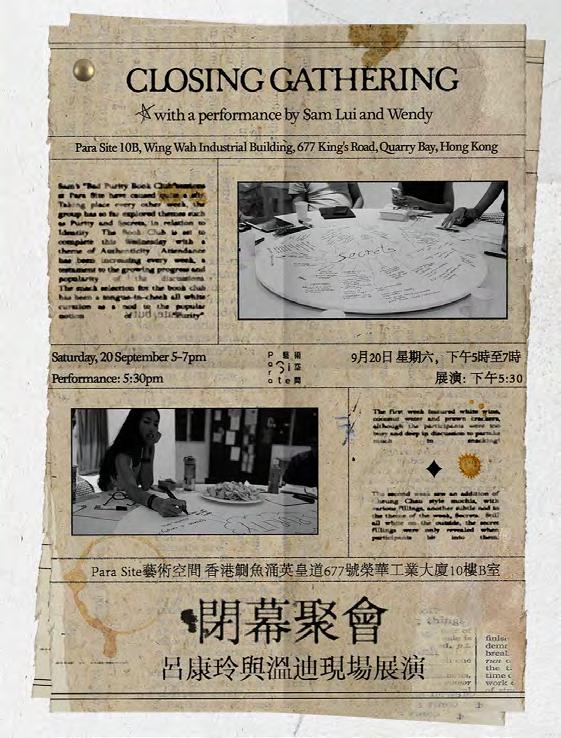
Welcome to the closing gathering of Sam Lui’s residency at Para Site—a reflection and retelling of Wendy’s Wok World—a persona-driven project that unpacks the disciplinary world of wok cooking alongside questions of purity, secrecy, and authenticity.
Through the ‘Bad Purity Book Club’ and her studio research, Sam has deepened her exploration of how authority and identity are performed, fractured, and concealed.
Purity
Purity is sameness: that which is without contamination or adulteration, without otherness. As a state, it is often framed as an original condition before corruption, or as an end goal to strive towards. Purity in ideals is alluring for its absoluteness and order, lending itself as a tool for both personal and collective identity-making. Yet it also carries rigidity that can entrap and exclude, dispelling nuances that fail to fit the ideal.
Wendy’s Wok World employs the tool of a character, an alter ego who is a wok apprentice, to probe purity through the lens of an exacting culinary tradition. Wok Cooking demands precision, timing and control. It is a discipline steeped in rigour and principle. In striving to master these techniques, Wendy becomes the embodiment of this pure and absolute system.
The narrative brings to light the devotion and internalised authority that is often tied into the attraction of purity in cultural practices, while also questioning the promotional powers of ‘sentimentality’. By performing this character study in the real world, the project has invited genuine responses to Wendy and all she stands for, prompting a storyline that continues to feed back into the examination of purity.
The project invites us to consider:
• Why are we drawn to order and ideals?
• How do we make sense of our identities through subscribing to ideals?
• Does it matter who sets the ideal?
Purity thus becomes not only the subject of study, but also the medium through which identity itself is revealed.
If Purity is Sameness that is manifested as Ideals, Pollution is Otherness that is manifested as Secrets.
Purity
Pollutions
Sameness
Otherness
Ideals
Secrets
In many ways, ideals and secrets are co-dependent. Just as there is no purity without pollution (and vice versa), there can be no ideal without secrets. Secrets are created to sustain ideals externally, while ideals can be created to conceal secrets. In this sense, secrets may be seen as the flipside of idealism.
In examining purity’s relation to identity-making, the role of secrets in the formation of identity is illuminating.
Secrets mark the distinction between the self and the external. They help to constitute identity, while the act of sharing—or the potential to share—a secret grounds an individual’s identity in the real world.
Ideals are the external projections, while secrets are interior truths. In this way, Wendy may be seen as a constructed identity, with Sam as the ‘secret’ self. The audience may ask:
• What is the impulse behind making an alter ego?
• How does forming our identities outwardly shape our relationship with the true self?
• Can distinguishing a ‘secret self’ fortify our sense of identity?

• In what kind of world is the only way to have a secret self to project a complete alter ego?
Against today’s backdrop of transparency and surveillance, we are conditioned to project our identities externally, to share—and overshare—voluntarily. In such a context, there is little room for secrets. Wendy’s Wok World questions whether it is possible to carve out distance from our external selves. By projecting a complete alter ego into the world, and allowing that alter ego to supersede the ‘real self’, can we reserve space for true interiority?
